
When we think of the past, one of the first thoughts that runs through our mind is how people lived without electricity. Nowadays, we can’t even imagine a day without it because all of our appliances and devices run on electricity.
The truth is, however, that most homes don’t have enough power outlets to keep everything running and charged, so most of us rely on power strips without being aware that appliances that consume a lot of energy become dangerous fire hazards when we plug them into a power strip.
Although power strips are the thing to go to when it comes to charging your phone or power an entertainment setup, there are certain devices that should never be plugged into a power strip.
Air conditioners, space heaters, toasters, and other appliances that use high wattage can easily cause power strips to overheat, which can easily lead to a fire hazard.
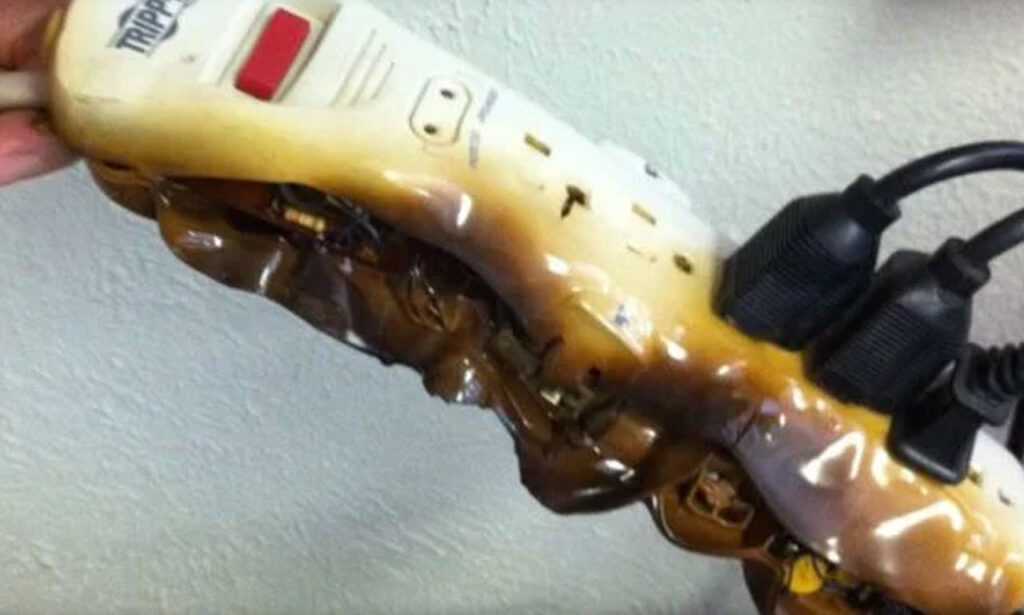
Even before plugging anything into a power strip consider the ammount of power they support. This is usually listed on the product itself.
High-capacity appliances need to draw a lot of power through an electrical circuit to work. Keep in mind that an appliance does not need to be large in size to draw large amounts of power.
Below is the list of appliances that should never be plugged into a power strip.
1. The oven: Even though the oven is not used continually, it is a power-hungry appliance that should not be plugged into a power strip. In fact, it should be plugged into its own wall outlet on its own circuit.
2. Refrigerator: Refrigerators require a lot of power and frequently cycle on and off which can easily overload a power strip and cause damage. Much like the oven, refrigerators require a wall outlet dedicated solely to powering the appliance.
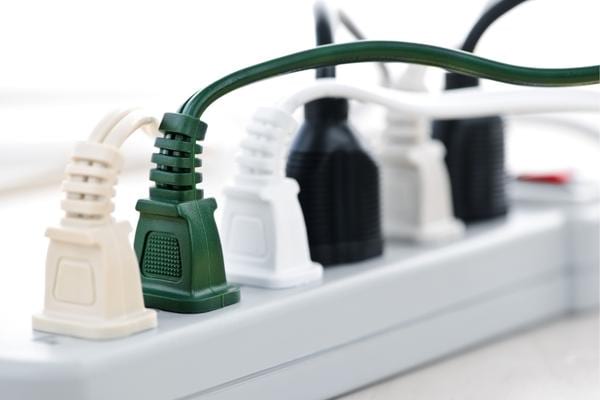
3. Washing Machine: When turned on, washing machines pull a lot of power. This is the main reason why these appliances shouldn’t share a receptacle with any other appliance or device.
Most washing machines use a max of up to 1400 watts, putting it dangerously close to the max load of most power strips. On top of that while working, washing machines are usually left unattended and work longer hours, at least an hour, which is long enough for a power strip to overheat.
4. Heating: Portable heaters should never be plugged into a power strip because most of them use 1,500 watts of energy on their high setting and they usually run for extended periods of time.
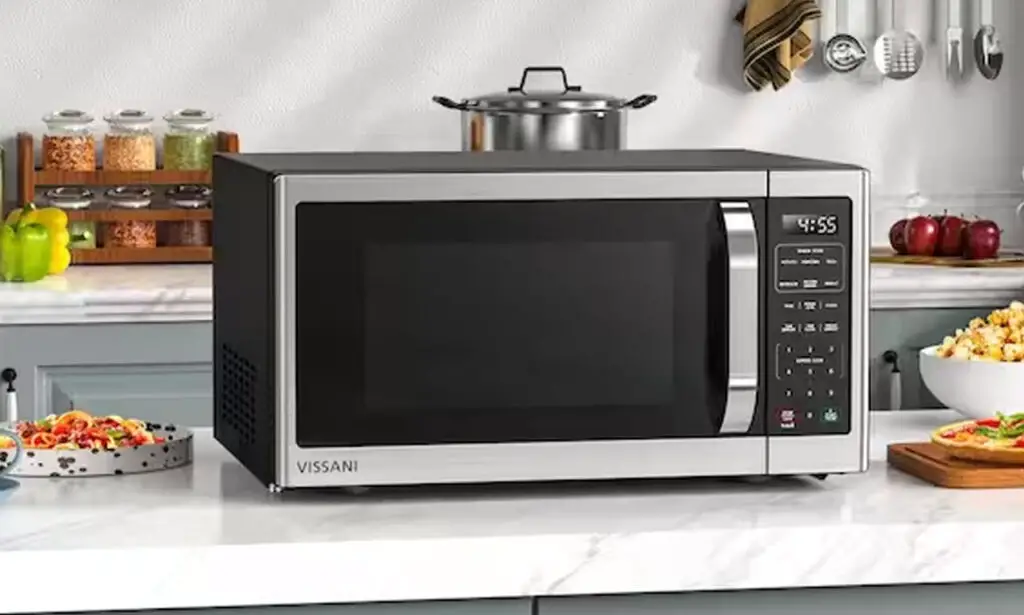
5. Microwave: Since they consume a lot of energy when used, most microwave ovens are plugged into their own receptacle and that is always a good practice.
6. Coffee Maker: Those who own a coffee maker are not fully aware of the power these appliances use, and this is why they should never be plugged into any sort of power strip or extension cord.
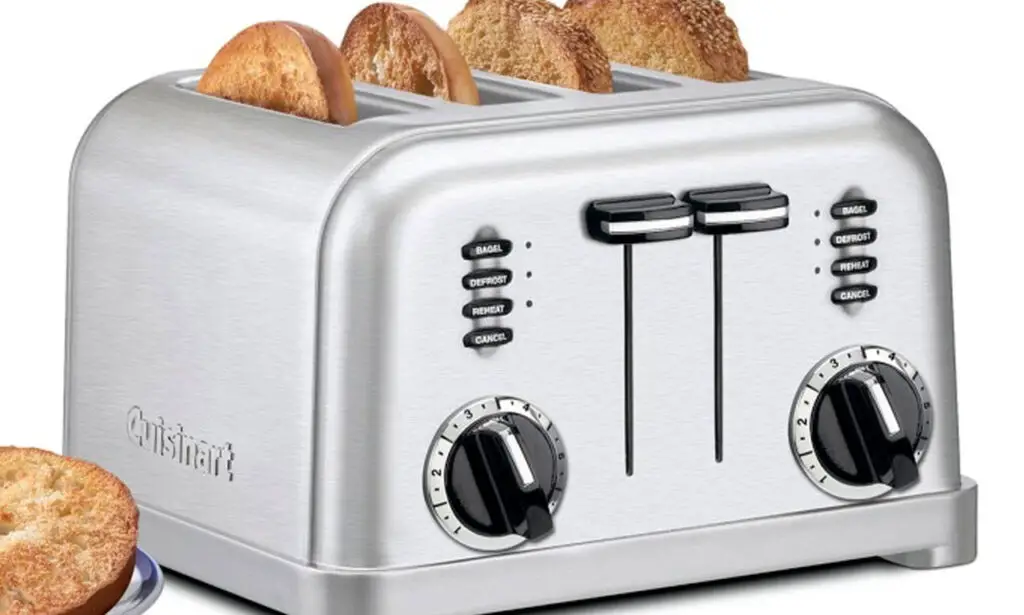
7. Toaster: You may think that browning up slices of bread or bagels doesn’t require a lot of energy, but the truth is that toasters use a lot of energy when in use and they should be plugged directly into the receptacle rather than a power strip.
8. Another Power Strip: Power strips are not meant to be used in conjunction with another power strip, although many people do exactly that. This, however, violates most safety codes because it can easily lead to overloading the electrical system.
9. Electronics (Computer, TV, Router): These types of electronic devices don’t necessarily use a lot of power on their own, but they are sensitive to surges and you can find yourself with a burnt out computer or TV very quickly if you plug them into a power strip.
If you want to protect these sensitive devices from power surges, opt for a power strip that functions as a surge protector.
14+ Actors Who Almost Played Key Characters in “Harry Potter”
Many factors come into play when producers are casting actors for a big hit like Harry Potter. These choices are often so well-made that the viewer creates a powerful relationship with the character. This powerful relationship makes it hard to dissociate the image of the actor and their on-screen role. For instance, can you imagine a Harry Potter played by someone other than Daniel Radcliffe, or a Hermione not played by Emma Watson? Well, even though many of us think that these actors were “born” to play these roles, it is possible that on several occasions the producers did not agree at first and they may have even chosen someone else. It’s hard to believe, but true.
At Bright Side, we’re all Potterheads. That’s why we’d love to share with you all the fun facts about the “wizarding world” that we found out there. We’d also like to extend an invitation to a parallel universe where other actors that were about to play some of the most famous wizards in the world actually did get the roles. Don’t forget to check out the bonus at the end of the article!
1. Ian McKellen — Albus Dumbledore

Sir Ian McKellen, known for the amazing performances he delivered in movies like The Lord of the Rings and The Da Vinci Code, as well as in many theater plays, was asked to bring the famous wizard Albus Dumbledore to the big screen after actor Richard Harris, the then-Dumbledore interpreter, sadly passed away. This happened back in 2002, but McKellen had to face a tough dilemma after which he decided to turn down the opportunity.
It all started when, back in the day, Richard Harris said that even though he found McKellan to be a brilliant actor in terms of technique, he lacked passion when acting. McKellan had to decide whether he’d take on the legacy of a man who disapproved of him as an actor. We all know how the story ended. McKellen refused, saying that he “couldn’t take on the role of an actor who didn’t approve of me.” While we all think he would have played an amazing role as Dumbledore, it was Michael Gambon who eventually landed the role.
2. Saoirse Ronan — Luna Lovegood

Actress Saoirse Ronan became popular after she appeared in films like The Lovely Bones and Little Women. But few people know that she actually auditioned to play the role of Luna Lovegood in the Harry Potter saga. Unfortunately, she did not get the role, which Evanna Lynch ended up landing because she was specifically chosen by the creator of the story, J.K. Rowling. According to her, Lynch was the perfect person to play this character.
Saoirse, however, admitted that she was disappointed when she learned that she was not chosen. During an interview Ronan said that she “was too young — but at the time I thought, ’I’d love to be in Harry Potter.’ When I was younger, I used to think they had the best job in the world.” Today, with more than 3 Oscar nominations in her pocket, we wonder what a Luna played by Saoirse would look like and what vibe she would have given to the whole franchise.
3. Liam Aiken — Harry Potter

Originally, Liam Aiken, the star of the saga A Series of Unfortunate Events, was supposed to have starred in the role of Harry Potter on the big screen. However, J.K. Rowling had her say once again, and that changed everything. The writer demanded that the whole cast of the movie be composed of only British actors. This instantly ruled out Aiken and that opened the door for British actor Daniel Radcliff to land the role that defined his career when he was barely 11 years old.
According to the British newspaper The Guardian, J.K. Rowling even took the time to call producer Chris Columbus, who was in charge of adapting her books to the movies just to make sure that Aiken didn’t get the part. It is believed that the reasoning behind Rowling’s decision was to ensure that the films remained faithful to the books, which were supposed to be British in every sense of the word. It’s unclear as to whether Aiken would have delivered a better performance than Radcliff, who in any case did a great job.
4. Robin Williams — Rubeus Hagrid

Once again, J. K. Rowling was very adamant when it came to not allowing the movie about the most famous wizard to be cast using American actors… Being British herself, she put enormous pressure on the production team to get what she wanted. In the end, she got it her way: the cast ended up being entirely British, which indeed, gave a special feeling to the movies. So, in addition to Liam Aiken, Robin Williams, who was cast to play the iconic Rubeus Hagrid, was also vetoed from the saga. This beloved character was, in the end, portrayed with great mastery by Robbie Coltrane. We are sure that, like Coltrane, Williams would have done a great job!
5. Helen McCrory — Bellatrix Lestrange

The great and scary witch, Bellatrix Lestrange, was originally going to be played by Helen McCrory. With McCrory being English, there was no possible veto coming from J.K. Rowling. However, at the time in which the Harry Potter movies were to be shot, the star from Netflix’s drama series Peaky Blinders became pregnant. There’s probably no better reason to give up playing such an amazing character. Eventually, it was Helena Bonham Carter who replaced McCrory and she delivered one of the best performances of the saga. Still, McCrory hadn’t said her final words on the matter. Luckily for us, she managed to come back to the casting in the last 3 movies, but this time as Narcissa Malfoy.
6. Henry Cavill — Cedric Diggory

Before Cavill even dreamt of becoming the famous Superman who won the hearts of thousands of viewers around the world, things weren’t looking so bright for him. In fact, Cavill managed to lose not one, but 2 roles to Robert Pattinson. The first one is maybe lesser known by the public. He tried to get into Harry Potter and the Goblet of Fire, where he auditioned to play Cedric Diggory. The second role he lost to Pattinson is a well-known story. Cavill came close to playing the role of Edward Cullen, the protagonist in the Twilight saga.
In fact, in the latter, he even turned out to be the first choice of writer Stephenie Meyer, creator of the “Cullen universe.” However, as you probably know, both roles, in the end, went to Pattinson. Cavill simply thought of the rejections as “something good” that happened in his life. After all, things happen in due time and there’s no reason to rush anything.
7. Hatty Jones — Hermione Granger

As for the role of Hermione Granger, producers had a hard time deciding between 2 young actresses that were equally fit to play the smarter sorceress of Hogwarts: Hatty Jones, star of the feature film Madeline, and Emma Watson, who until then was an unknown actress. Interestingly enough, the decision was made based on casting director Janet Hirshenson’s impressions of Emma. Hirshernson believed the young woman would bring a much-needed “dull” side to the whole story. In the end, it seems like she did the right thing, given that Watson managed to steal the audience’s hearts and souls thanks to her skills and empathic nature.
“A star is born,” Hirshenson said during an interview. Hirshenson’s decision was so accurate that today it would be impossible to imagine any other actress playing Hermione.
8. Jamie Campbell Bower — Tom Riddle (Lord Voldemort when he was a young man)

Actor Jamie Campbell Bower is most likely a big fan of the wizard sagas. This beloved star had not only been part of the cast of Twilight, but he also appeared in The Mortal Instruments: City of Bones. Of course, little did he know back then that he would also appear in other movies based on J.K. Rowling’s work Fantastic Beasts and Where to Find Them, a franchise that acts as a sort of spin-off for the Harry Potter world. He played Grindelwald in both Harry Potter and the Deathly Hallows — Part 1 and Fantastic Beasts: The Crimes of Grindelwald.
And we’re saying that because we want to clarify something that many people still don’t know: before landing that role, Jamie Campbell Bower had auditioned to play the young version of Tom Riddle (Lord Voldemort) in the sixth film of the Harry Potter saga. Not only that, but he was even featured in Teen Vogue magazine. In the end, he was not chosen to play the part, but the reasons behind his rejection remain unclear. The role was, as you know, left in the hands of Frank Dillane.
9. Eddie Redmayne — Another version of Tom Riddle (Lord Voldemort when he was a teenager)

Jamie Campbell Bower wasn’t the only actor who was interested in playing the young version of Harry Potter’s nemesis, Lord Voldemort, also known as Tom Riddle. Much like Campbell Bower, Eddie Redmayne didn’t manage to land the role of the larger-than-life villain, but his patience was also rewarded when he was cast in the Fantastic Beasts and Where to Find Them franchise, this time as the main character, Newt Scamander.
During an interview, Eddie revealed that even though he didn’t even receive any feedback after the audition, over the years he still had a ray of hope shining somewhere inside his soul that he would at least be cast as one of the Weasley family members. Of course, as we all well know, this didn’t happen. But fortunately, this brilliant actor did manage to get to play his part in a universe created by J. K. Rowling and he did a great job. In the end, it was Christian Coulson who played Tom Riddle in Harry Potter and the Chamber of Secrets.
10. Tilda Swinton — Sybill Trelawney

Oscar winner Emma Thompson took on the role of Professor Sybill Trelawney. However, before the deal was closed between the producers and Thompson, the character was first offered to fellow Golden Statuette winner Tilda Swinton, who turned it down. While her decision might come across as something strange when looking back, as Swinton explained in an interview, according to her the saga romanticized boarding school life and she didn’t really want to be a part of that:
“I think this is a very cruel environment that children have to grow up in, and I don’t think it’s beneficial to their education.” We’re not entirely sure if Swinton was right or not to reject the role, but one thing we can all agree with is that Emma Thompson was as perfect for the role as Swinton would have been, would she have decided to jump on board.
11. Jason Isaacs — Gilderoy Lockhart

Jason Isaacs, known today for having played Lucius Malfoy, initially wanted to play a completely different role: half-blood wizard Gilderoy Lockhart. However, the producers felt that Isaacs would be a much better fit for Draco Malfoy’s father and also one of the greatest adversaries that Potter has had to deal with during the whole saga. The funny thing is that, at the same time, the actor was already slated to play Captain Hook in Peter Pan, so he didn’t want to be linked to the image of 2 childish villains. This is the reasoning that led him to turn down the role in the first place.
Luckily for us and all Potterheads, Isaacs’ family stepped in and convinced him to play the wizard known for having long, smooth blond hair. “Over the weekend, everyone who knew me called me: nieces, nephews, godchildren, and then their parents,” he said. “They all tried to persuade me to take the job, not because they cared about me, but because they wanted to visit the set!” he added laughingly.
12. Kate Winslet — Helena Ravenclaw

When one of the most popular sagas of the time was coming to an end, producers thought they had to come up with a great way to say goodbye. They wanted every detail to be perfect and that included finding an actress who could live up to the greatness of Helena Ravenclaw, a character whose part in the narrative was kind of short, but of the utmost importance. The name at the top of the list was Kate Winslet. Unfortunately, her agent rejected the script even before checking to see if she was interested at all in taking part in the project. That’s how the Grey Lady ended up being played by the equally brilliant Kelly Macdonald.
13. Thomas Brodie-Sangster — Ron Weasley

Thomas Brodie-Sangster revealed that he would have loved to play Ron Weasley on the big screen. Not only that, but he actually gave it a try and ended up losing the opportunity to Rupert Grint, the little redhead that is now very well-known to all of the fans of the saga. However, despite not having passed the test, the actor from Nanny McPhee, also said that this first “tough” experience of rejection in the entertainment industry “allowed him to maintain a more ’optimistic’ attitude during the audition processes for future roles.” As the popular saying goes, “Every cloud has a silver lining.”
14. Tom Felton — Ron Weasley and Harry Potter

You might find this hard to believe, but it’s true. Before becoming the naughty Draco Malfoy, Tom Felton auditioned to play Ron Weasley and even Harry Potter. Despite not being chosen for either role, the actor claims there was never any jealousy or rivalry behind the scenes between him and Radcliffe or Grint. On the contrary, he was very grateful to have the opportunity to appear in the movies at all. “I’m even more grateful that I got the character of Draco, there was a great sense of kind of being on a team,” he said. And it seems that the choices were indeed perfect, like Felton mentioned, as that’s how each of the actors becomes a living legend in their own role.
Bonus: The creator of the Harry Potter universe, writer J. K. Rowling, was asked by producers to play Lily, the mother of The Boy Who Lived.
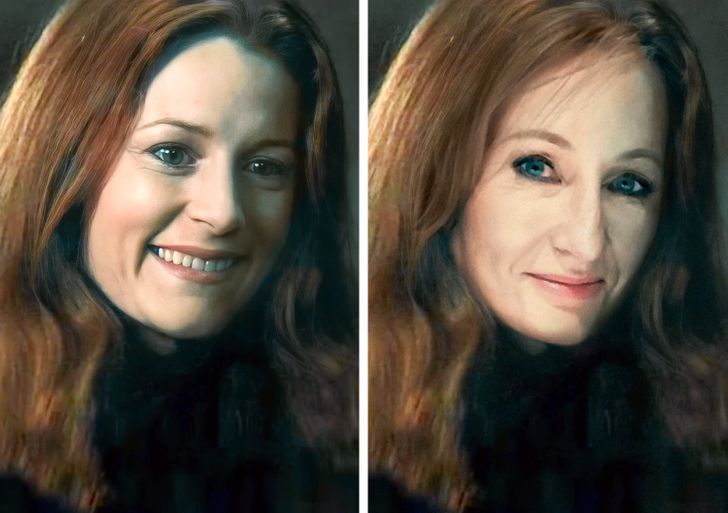
There’s no point in denying that there is a great similarity between J. K. Rowling and Geraldine Somerville. Maybe that is why the producers of the saga wanted the writer to take on the role of Lily Potter in Harry Potter and the Philosopher’s Stone, since she fit “the profile” so well. However, Rowling politely declined the invitation: “The filmmakers did ask me to play Lily Potter in the first film, but I really am not cut out to be an actress, even one who just has to stand there and wave. I would have messed it up somehow.” It’s hard to believe that maybe we could have had the chance to see J. K. Rowling on the big screen, but it’s true. And we actually think that she would have done a great job!
Most people think that producers made the right call with the cast they chose for the Potter movies. Do you agree or is there someone who you think would have done a better job? Is there anybody you would have wanted to see casting a spell on the big screen?



Leave a Reply